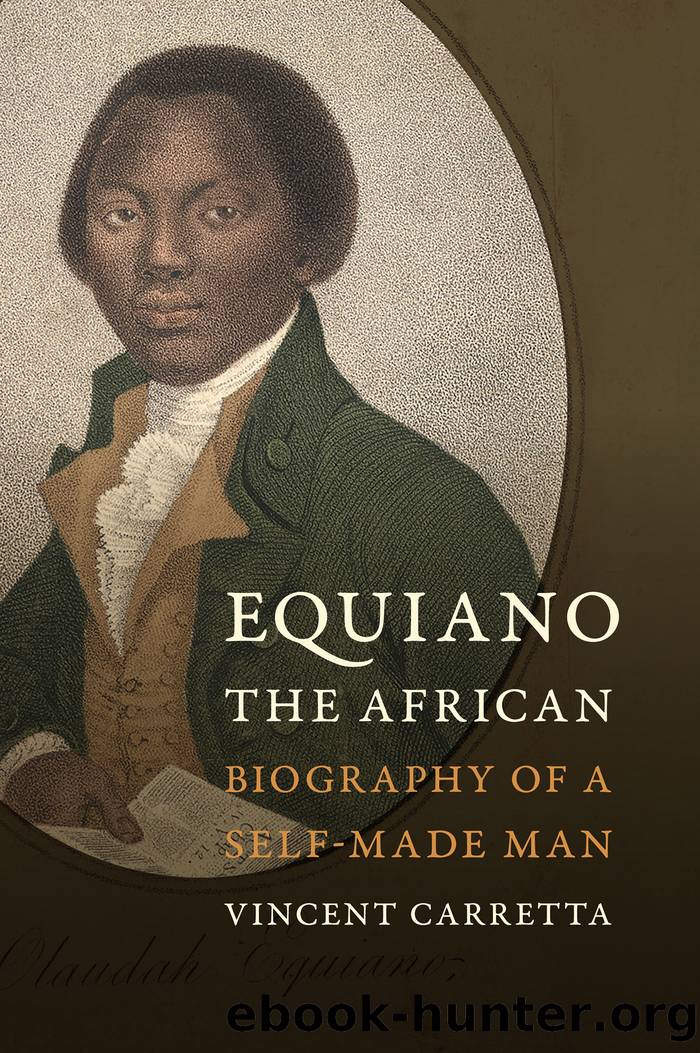Equiano, the African by Vincent Carretta

Author:Vincent Carretta
Language: eng
Format: epub
Publisher: University of Georgia Press
Published: 2022-01-15T00:00:00+00:00
James Ramsay, by Carl Frederik von Breda. Ramsay, an abolitionist Anglican minister who had served in the Royal Navy, initiated the press war during the 1780s over the treatment of slaves in the West Indies. A friend of Equiano since the 1760s, Ramsay subscribed for two copies of The Interesting Narrative. (National Portrait Gallery, London)
So few people had boarded the ships by the time Equiano became involved with the project in October 1786 that the date of departure had to be postponed and surplus provisions needed to be sold. When the commissioners of the Navy Board ordered Equiano in January 1787 to âdispose of such surplus to the best advantage you can for the benefit of government, keeping and rendering to us a faithful account of what you do therein,â he discovered that Irwin was dishonest. âDuring my continuance in the employment of government,â he later wrote, âI was struck with the flagrant abuses committed by the agent, and endeavoured to remedy them, but without effect. One instance, among many which I could produce, may serve as a specimen. Government had ordered to be provided all necessaries (slops [ready-made clothes], as they are called, included) for 750 persons; however, not being able to muster more than 426,38 I was ordered to send the superfluous slops, &c. to the kingâs stores [the Royal Navy storehouses] at Portsmouth; but, when I demanded them for that purpose from the agent, it appeared they had never been bought, though paid for by governmentâ (327-28). Worse yet, he said, was Irwinâs treatment of the poor: âBut that was not all, government were not the only objects of peculation [embezzlement]; these poor people suffered infinitely more; their accommodations were most wretched; many of them wanted beds, and many more clothing and other necessariesâ (328).
Equiano took his charge as the governmentâs representative very seriously â perhaps too seriously. He objected that Irwin had purchased, at the settlersâ request, âTea and Sugar and other Necessaries allowed for the use of the women and childrenâ and that âunauthorizedâ passengers had been taken on board, even though they were probably white artisans whose skills would be needed in the settlement.39 Unhappy with Irwinâs response to his and the settlersâ complaints, Equiano âapplied in February 1787 for a remedyâ to Thomas Boulden Thompson, commander of the Nautilus, a sixteen-gun sloop the navy had assigned the month before to convoy the settlers to Africa. Equiano âeven brought him to be a witness of the injustice and oppressionâ he complained of. He also âinformed the Commissioners of the Navy of the agentâs proceedingâ as well as the chairman of the committee, Samuel Hoare (228, 328). His complaints only contributed to his own dismissal on 24 March.
One of the reasons for Equianoâs dismissal was Thompsonâs letter of 21 March 1787 lamenting to the Navy Board âthe conduct of Mr Gustavus Vasa, which has been, since he held the situation of Commissary, turbulent and discontented, taking every means to actuate the minds of the Blacks
Download
This site does not store any files on its server. We only index and link to content provided by other sites. Please contact the content providers to delete copyright contents if any and email us, we'll remove relevant links or contents immediately.
Machine Learning at Scale with H2O by Gregory Keys | David Whiting(4289)
Never by Ken Follett(3930)
Harry Potter and the Goblet Of Fire by J.K. Rowling(3841)
Unfinished: A Memoir by Priyanka Chopra Jonas(3370)
Fairy Tale by Stephen King(3365)
The Man Who Died Twice by Richard Osman(3060)
Will by Will Smith(2901)
Rationality by Steven Pinker(2348)
It Starts With Us (It Ends with Us #2) by Colleen Hoover(2327)
Can't Hurt Me: Master Your Mind and Defy the Odds - Clean Edition by David Goggins(2319)
The Dark Hours by Michael Connelly(2299)
The Storyteller by Dave Grohl(2222)
Friends, Lovers, and the Big Terrible Thing by Matthew Perry(2211)
The Dawn of Everything: A New History of Humanity by David Graeber & David Wengrow(2185)
The Becoming by Nora Roberts(2183)
The Stranger in the Lifeboat by Mitch Albom(2110)
Cloud Cuckoo Land by Anthony Doerr(2087)
Love on the Brain by Ali Hazelwood(2053)
Einstein: His Life and Universe by Walter Isaacson(2003)
